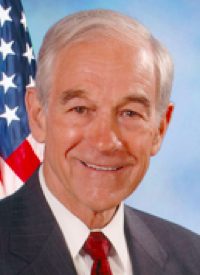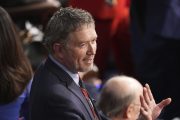
In a lengthy interview with Bloomberg’s Al Hunt, Paul stated his belief that despite House Speaker John Boehner’s (R-Ohio) insistence that he will demand one dollar of spending cuts for every dollar the debt ceiling is increased, “it’ll go up to the last minute and they will raise the debt ceiling.” Paul said he doesn’t take Boehner’s posturing seriously, recalling that when Ronald Reagan agreed to a tax increase back in the 1980s, “he said he wanted two dollars of cuts for every dollar [of tax increases]. Nothing happened. The deficit exploded.”
The Congressman doesn’t expect the public to take such talk seriously, either, especially when most of the cuts will be slated for many years in the future. “The only budget that counts is this year, not what’s happening next year, the year after, a five-year program, a 10-year program,” he explained. “That’s all pie-in-the-sky talk.” Hunt suggested the Republican leadership might propose, in exchange for increasing the debt ceiling, a spending cap that would go into effect a decade from now. Paul rejected the idea out of hand, saying, “I think it’s too little, too late, and nobody’s going to believe it.”
In response to the notion that failing to raise the debt ceiling would be a catastrophe, Paul said that he would refuse to vote for any debt ceiling increase because “the catastrophe comes regardless because as long as they encourage more spending, then we go over a cliff.”
A default on the federal government’s obligations, debt ceiling hike or not, is a certainty, Paul said. “We’re defaulting constantly,” he maintained, not by failing to pay the government’s bills but by paying them via inflation of the money supply, “and therefore people are losing their purchasing power. So the common person, the average person, the middle class, and the poor, especially the people that lose their jobs — we’re defaulting on them all the time.”
In addition, as Jacob Hornberger of the Future of Freedom Foundation observed, the government is also defaulting on its debt through inflation. When the Federal Reserve prints money to pay off the government’s debts, Hornberger wrote, “the inflated supply of money cheapens the value of the money in circulation, which means that bondholders are being repaid in currency that is worth less than it was when they loaned it” — the very definition of default.
The Fed, being the source of so many of our ills, was discussed at length in the Bloomberg interview. Fed Chairman Ben Bernanke is on the defensive, Paul asserted, but “he can’t defend [his policy] because it’s a failed policy.” “People are starting to realize this,” he averred, “and people know now that you have a lot more … to blame than high labor costs and high profits. You go to the Federal Reserve for the business cycle, the financial bubbles and the crashes, and then the bailing out of trillions of dollars for special interests.”
Asked if other GOP presidential candidates were talking about the Fed in the same way he is, Paul replied with obvious satisfaction, “There’s no way, but they won’t laugh as much as they did last time. The last time they laughed, and scorned my foreign policy, and they’d laugh at my monetary policy. They won’t laugh any longer.”
Indeed, this may be Paul’s biggest achievement even if he never wins the presidency: making public discussion of these previously taboo subjects acceptable and even expected. As he himself remarked, many of the other candidates are now talking “about printing-press money, and they’re even talking about coming back overseas” — things they almost certainly would not be mentioning were it not for Paul’s bringing them to the public’s attention during his 2008 presidential campaign and the succeeding years.
As to his no-longer-scorned foreign policy, Paul stated that he would bring all the troops home not because, as the political class would have it, he wishes for a weak America but “because I believe in a strong national defense, and I think [having troops stationed around the world] hurts our defense.” He also connected the United States’ ever-expanding military commitments to the government’s budgetary woes, saying “the people are with me on this” because they “now know we can’t pay [for] it.” “A lot of conservatives are coming in our direction” for the same reason, he added. He continued:
As much as I’m opposed to all the spending — I’d cut it across the board if I have to — but I said, if you want to do it purposely and in a deliberate fashion, have priorities. And my priority is you cut off all foreign welfare and foreign militarism and corporate welfare before you go after child healthcare. And that sells. And you don’t have to just address healthcare for poor people rather than this atrocious spending that we do overseas.
In other words, the warfare state is just as problematic as the welfare state, but the way to win converts to cutting the welfare state is first to gut the warfare state. Paul hasn’t won 11 House races with a political tin ear.
Asked what makes him stand out from the increasingly crowded field of Republican presidential contenders, many of whom are now echoing Paul’s sentiments on various subjects, the Congressman replied, “I think there will be a credibility gap.” While the other candidates have only recently “gotten religion” on monetary and foreign policy, voters will “know that I’m leveling with them, and I’ve done it all along, and I’ve expressed these concerns for 20, 30 years,” he said. And that is a statement no other candidate can truthfully make.
Photo: Ron Paul


